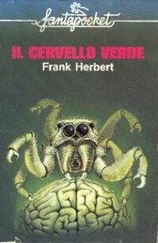Frank Herbert - Destination - Void
Здесь есть возможность читать онлайн «Frank Herbert - Destination - Void» весь текст электронной книги совершенно бесплатно (целиком полную версию без сокращений). В некоторых случаях можно слушать аудио, скачать через торрент в формате fb2 и присутствует краткое содержание. Год выпуска: 1965, Жанр: Фантастика и фэнтези, Эпическая фантастика, на английском языке. Описание произведения, (предисловие) а так же отзывы посетителей доступны на портале библиотеки ЛибКат.
- Название:Destination: Void
- Автор:
- Жанр:
- Год:1965
- ISBN:нет данных
- Рейтинг книги:5 / 5. Голосов: 1
-
Избранное:Добавить в избранное
- Отзывы:
-
Ваша оценка:
- 100
- 1
- 2
- 3
- 4
- 5
Destination: Void: краткое содержание, описание и аннотация
Предлагаем к чтению аннотацию, описание, краткое содержание или предисловие (зависит от того, что написал сам автор книги «Destination: Void»). Если вы не нашли необходимую информацию о книге — напишите в комментариях, мы постараемся отыскать её.
Destination: Void — читать онлайн бесплатно полную книгу (весь текст) целиком
Ниже представлен текст книги, разбитый по страницам. Система сохранения места последней прочитанной страницы, позволяет с удобством читать онлайн бесплатно книгу «Destination: Void», без необходимости каждый раз заново искать на чём Вы остановились. Поставьте закладку, и сможете в любой момент перейти на страницу, на которой закончили чтение.
Интервал:
Закладка:
Bickel: "Negative feedback, Prue. Input adjusted to the output. If the system malfunctions, the human operator repairs it, like repairing a dam in a stream so you catch a significant amount of the flow."
Prudence (looking up from a length of neuron fiber she was feeding into a micro-manipulator): "Consciousness...ind of negative feedback?"
Bickel: "You ever think, Prue, that negative feedback is the most terrifying perfectionist in the universe? It won't permit failure. It's designed to keep the system running between certain limits no matter what the disturbance."
Prudence: "But... these Ox circuits... you've deliberately introduced errors that aren't -"
Bickel: "Why not? All our conventional ideas about feedback imply a certain uniformity of environment. But we live in a nonuniform universe. That place out there isn't completely predictable. We've got to keep it off balance out there... by changing the rules ourselves at random."
Order opposed to chaos, Flattery thought glancing at the overhead screen. Lord! How that block-upon-block extrusion was spreading out from the computer wall! It had proliferated into two major growths with a jungle of vinelike pseudoneuron sheafs between them and around them and over them.
Bickel lay on his back working beneath the structure. Loops of the main bus connections hung down just above his knees.
We are not awake, Flattery thought.
Oh, God! How easy it'd be to give up right now! He was here in the driver's seat, wasn't he? One of the triggers was at hand. Who'd ever know? The ship would die... the problem end. Let the bastards at UMB try again... with somebody else.
But that was the real problem: they'd try again, all right, but not with somebody else.
The same miserable charade - over and over and over!
Look at Prue down there, he thought. She's stopped her anti-S injections. She's experimenting with her body chemistry. She'll be posturing and twisting in front of Bickel pretty soon. And the only way he sees her is as an expert with the micro-manipulator. She does good work!
We are not awake.
Consciousness itself created variety, developed offshoot probabilities. And variety thrived on variety. The very act of playing their own special music produced the unpredictable - produced errors.
Where does communication break down?
Bickel (grunting as he squirmed out from beneath the Ox): "The generalized body and the specialized brain, Prue - put 'em together and what've you got? Illusion. That's the buffer, illusion. It's the protective layer that lets virtually incompatible systems get in bed together. Consciousness is a producer of illusions."
Prudence: "Where'd you store the R4DBd neuron reel?"
Bickel: "Second rack, left end of the bench. Now, you take the illusion of central position."
Prudence: "That's the natural result of a baby's helpless dependence on its environment. A baby is the center of the universe. We never lose that memory."
Bickel: "Well, individual sense impressions are something like pebbles dropped in a four-dimensional pond. Consciousness locks onto the waves created by those pebbles, and gives them a spatial and temporal integration so they can be interpreted. Consciousness has to make sense out of things. But its major tool is illusion."
Spatio-temporal integration, Flattery thought.
The identity that was the ship - their Tin Egg - it lacked a certain integrating ability at the moment. Instead of an efficient self-regulating force, the ship was making do with the inadequate feedback system represented by four humans loosely connected to its "nervous system."
That was one way of looking at it.
But there was a point in the ship's future where damage passed beyond their ability to recover. The humans were failing.
Flattery felt then a deep bitterness toward the society that had sent this frail cargo into nowhere. He knew the reasons but reasons had never prevented bitterness.
"Think of society as a human construction, a very sophisticated defense mechanism," Hempstead and his cohorts had said. "Society's restrictions get bred into the cells themselves by a process of selection. And these restrictions become part of the self-regulating feedback in society's governing systems. There's a serious question whether humans actually can break out of their self-regulated pattern. It takes audacious methods indeed to explore beyond that pattern.
The law was stated, Flattery knew, thusly: "Individual human experience is not the overriding control factor in human behavior. The cellular social pattern dominates."
Flattery deliberately rapped his knuckles against the edge of his action couch to shock himself out of this reverie. He focused on the console, saw he had the usual temperature adjustments to make. The automatics could never quite hold the line.
Bickel: "Watch those lengths in the time-delay circuits. You'll confuse the Ox's psychological present."
Prudence: "Its what?"
Bickel: "Its psychological present - its 'specious present' - what you experience in any given instant: that short interval you call now. Prof. Ferrel - remember old Prof. Ferrel-barrel?"
Prudence: "Who could forget Hempstead's son-in-law?"
Bickel: "Yeah, but he wasn't stupid. We were on the satellite tracker once - him on his side of the sterile wall and me on ours. And he said: 'Look at that thing move!' It was a shuttle ship coming in from earth. And he said: 'You know for a fact it's changing position fast as hell. But you seem to see all those position changes right now - in the present. No sharp edges; just a flow. That's the "specious present," boy. Don't you ever forget it.' And I never did."
Prudence: "Will the... Ox really experience time?"
Bickel: "It has to. Our time-delay circuits have to give it a way of internal measurement. It has to feel its own time. Otherwise, it'll be a big package of confusion."
Prudence: "The... now."
Bickel: "You think about it and you realize we don't interpret the immediate experience of time. We take big gulps of time. But real time, now, that has to be something gradual and progressive, a smooth change against a background of some measurement constant."
Prudence: "So we line up the Ox's physical time and set it going like some mechanical toy - in one direction."
Bickel: "The more remote parts of its 'specious present' have to fade the way they do with us. The past has to be less intense than what's just appearing on its horizon. It needs a constant 'serial fadeout'; otherwise, it won't be able to distinguish points near in time from points remote in time."
Flattery looked up into the screen, saw Bickel hook an oscilloscope to the Ox, run a pulse check.
Entropy, Flattery thought. One direction in time.
He projected a picture in his mind: jets of water - one labeled entropy and the other that thrusting probabilism they called Life. Balanced between the two like a ball on a fountain danced consciousness.
It's so simple, Flattery thought. But how do you reproduce it... unless you're God?
Bickel: "Hold on there! Don't hook in that layer without running your stepdown test."
Prudence: "You and your damn caution!"
Bickel: "Life is a very cautious proposition. An error in those stepdown circuits could screw us up royally. Remember this, Ox has to take complicated inputs and filter them down through simpler and simpler integrating systems until it finally displays the results as symbols on which to act. Think of your own sense of vision. How many receptor neurons in your retina?"
Prudence: "About a hundred and twenty million?"
Bickel: "But when the system gets back to the ganglion layer, how many cells there?"
Prudence: "Only about one and a quarter million."
Bickel: "Stepped down, see? The system takes hordes of sense impressions and combines them into fewer and fewer discrete signals. In the end, we get a sense datum called an image. But we interpret that image out of an enormous file of topological comparisons, all of them out of previously translated experience."
Читать дальшеИнтервал:
Закладка:
Похожие книги на «Destination: Void»
Представляем Вашему вниманию похожие книги на «Destination: Void» списком для выбора. Мы отобрали схожую по названию и смыслу литературу в надежде предоставить читателям больше вариантов отыскать новые, интересные, ещё непрочитанные произведения.
Обсуждение, отзывы о книге «Destination: Void» и просто собственные мнения читателей. Оставьте ваши комментарии, напишите, что Вы думаете о произведении, его смысле или главных героях. Укажите что конкретно понравилось, а что нет, и почему Вы так считаете.










